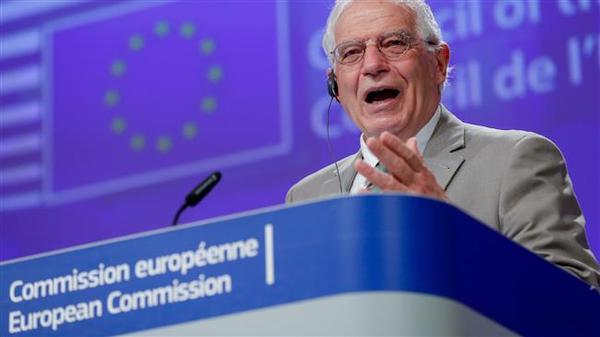
The European High Representative of the Union for Foreign Affairs, Josep Borrell attends a video conference with Europeans Foreign Ministers in Brussels, Belgium, on April 22, 2020. (Photo by AFP)
The European Union foreign policy chief says the 27-nation bloc will launch a diplomatic push to stop Israel from going ahead with its plan to annex much of the occupied West Bank.
Josep Borrell said in recent remarks that the EU would use "all our diplomatic capacities" to try to dissuade Israelís incoming administration from going ahead with the move.
The push will involve talking to Washington and Arab countries as well as Israel and the Palestinians, he noted.
"What everybody agreed is we have to increase our efforts and our reach out to all relevant actors in the Middle East," Borrell said.
"We are ready to do that and we will do that in the next days using all our diplomatic capacities in order to prevent any kind of unilateral action," he added.
The remarks come as several EU member states are alarmed at the prospect of annexations, which they say would violate international law and harm the chances of peace in the region.
Some EU countries have pushed for the bloc to take a tough stance against Israel, with Luxembourgís veteran foreign minister Jean Asselborn in particular calling for the recognition of a Palestinian state.
Earlier this week, the United Kingdom also reiterated its long-standing policy that it would not support annexations.
An overwhelming majority of the European Parliament lawmakers have already censured a US-devised Middle East proposal on the Israeli-Palestinian conflict, saying the contentious plan flies in the face of international law.
During a session in Strasbourg on February 11, the EU lawmakers said the plan that the administration of US President Donald Trump had drawn up in cooperation with Israel runs contrary to international law and is biased towards the regime in Tel Aviv.
Trump unveiled his controversial deal during an event at the White House alongside Israeli Prime Minister Benjamin Netanyahu in January, without the presence of the Palestinians.
The so-called ‘Vision for Peaceí - which all Palestinian groups have unanimously rejected - bars Palestinian refugees from returning to their homeland while enshrines Jerusalem al-Quds as "Israelís undivided capital" and allows the regime to annex settlements and the Jordan Valley.
Addressing the UN Security Council in February, Palestinian President Mahmoud Abbas reaffirmed his rejection of Trumpís initiative. He said that the proposal would bring neither peace nor stability and would rather leave the Palestinians with a state resembling "Swiss cheese."
Earlier this month, United Nations Secretary General Antonio Guterres in a meeting with the Arab Group delegation, including Oman, the Arab League and Palestinian officials, denounced Israeli settlements and the looming annexation plan as illegal.
He noted that the annexation proposal will "effectively end the [so-called] two-state solution and close the door on Israeli-Palestinian negotiations."
Jordanís King Abdullah II has also recently warned Israel that the regime should wait for a major clash with the kingdom if it goes ahead with plans to annex the occupied Palestinian territories of the West Bank and the Jordan Valley.
Abdullah said in comments published by the German magazine Der Spiegel on Friday that Amman was considering all options to respond to Israelís plans to begin the illegal annexation process in early July.
Netanyahu has set July 1 for the start of cabinet discussions on extending Israeli appropriation to settlements in the West Bank and annexing the Jordan Valley.
Israelís long-awaited coalition administration will be sworn in on Sunday - after three inconclusive elections in less than a year and a power-sharing agreement between Netanyahu and former rival Benny Gantz.
Israel occupied the West Bank and East Jerusalem al-Quds during the Six-Day War in 1967. It later annexed East Jerusalem al-Quds in a move not recognized by the international community.
Palestinians want the West Bank as part of a future independent Palestinian state with East Jerusalem al-Quds as its capital.
But Israelís aggressive settlement expansion and annexation plans have dealt a serious blow to any prospects of peace.
The last round of Israeli-Palestinian talks collapsed in 2014. Among the major sticking points in those negotiations was Israelís continued settlement expansion on Palestinian territories.
More than 600,000 Israelis live in over 230 settlements built since the 1967 Israeli occupation of the Palestinian territories of the West Bank and East Jerusalem al-Quds.
SOURCE: PRESS TV
LINK: https://www.ansarpress.com/english/17654
TAGS:






























 online news tv
online news tv




